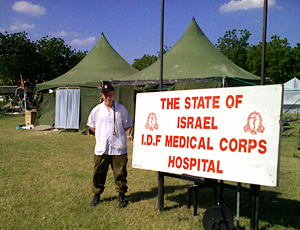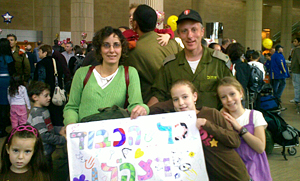

Offering Disaster Relief
Einstein Alum Recounts Disaster Relief Efforts in Haiti
Within days of the catastrophic 7.0 earthquake that hit Haiti in January 2010, Dr. Mitchell Schwaber, a major in the Israel Defense Forces (IDF) Medical Corps reserves, visited the impoverished and devastated country as part of an IDF team sent to set up a field hospital to aid the disaster's victims.

Dr. Schwaber on duty at the IDF Medical Corps Field Hospital in HaitiDr. Schwaber, director of Israel's National Center for Infection Control, also is a member of Einstein's class of 1991. On September 14, 2011, he returned to his alma mater to discuss the medical mission in a lecture at Riklis Auditorium titled "The Human Side of Israel."
His return to the Bronx campus carried special significance to Dr. Schwaber, who noted, "In addition to being an Einstein graduate, I'm also an Einstein legacy. My mother, Dr. Evelyne (née Albrecht) Schwaber, was in the class of 1959. She was one of just three women in Einstein's first graduating class… It's very meaningful to come back, especially to come back to speak to students."
Recalling the events that led up to the trip to Haiti, Dr. Schwaber said, "I found out about the earthquake the morning after it struck, on the way to work. By that afternoon, I was called out of a meeting by the Medical Corps reserve unit where I serve." He was asked to join the medical mission as one of two infectious disease specialists.
Two days later, a team of 121 Medical Corps staff, and an additional 109 service people – largely from the Home Front Command, who were assigned to provide logistic support and security – headed to Haiti. Once there, the team transformed a soccer field into a field hospital.
"The goal once we started to work was to stay there as long as we were needed," said Dr. Schwaber. That would mean that Haiti's medical infrastructure had recovered enough to resume operations and that other countries would arrive and set up medical facilities with sufficient capacity to replace the Israelis.
"As it turned out, we were operational for ten days."

Dr. Schwaber on return to Israel, being greeted by his wife Haggith and daughters (from left), Shakeid, Netta and NitsanMost of the injuries were orthopedic, but the team was set up to take care of a variety of other concerns. "We had full ICU capabilities, but in order to have continued turnaround we had to decide carefully who could take those beds and how long each surgical patient would have to be in recovery post-operatively," explained Dr. Schwaber.
Such decision making offered special dilemnas. "Can you discharge somebody when you know that in your usual day-to-day medicine you wouldn't let them go and now you're not only letting them go home, you're letting them go to what doesn't even pass as a home?," asked Dr. Schwaber. "At every single level of care, we were constantly grappling with medicine in a way that's not part of our everyday lives."
In one instance, a choice had to be made whether an infant in neonatal should be placed on a ventilator. "The tough decisions," said Dr. Schwaber, "were made by very senior medical people and, in many cases, there were ad hoc ethics committees that were established to take the onus off the individual caring doctors."
In the midst of overwhelming tragedy, Dr. Schwaber found much to praise. "The Hatians are beautiful people. There was a lot of dignity. The ones who weren't in agonizing pain were stoic and helping people in the next bed who were in pain."

Dr. Schwaber with Dr. Edward Burns, Einstein's executive deanHe also commended other teams and organizations and the collaborative spirit that arose amidst all the tragedy. For example, when the Israelis ran out of plaster for casting, the Moroccan embassy donated it.
During their 10-day stint, the Israelis formed a special bond with a surgical team from Colombia with whom the Israelis shared space and resources. "By having them on board, sometimes operating alongside us, we were able to augment the output of the number of patients operated on. It made for a great connection."
Dr. Schwaber also is proud of Israel's organized and timely response to the destruction. "I feel very fortunate that we were able to set up the way we did. What I saw in Haiti was how important it was to have a state-backed mission… Things outside the camp were very hectic, but within the camp things never got out of control."
Posted on: Monday, October 24, 2011

Tablet Blog